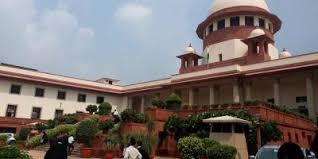The appellant who was working as a constable with the Border Security Force (BSF), applied for the post of Sub-Inspector General Duty (GD) through Limited Departmental Competitive Examination (LDCE) 2018-19 but was declared medically unfit (Para 2)
The writ petition (civil) so filed by the appellant was dismissed by the High Court (Para 4)
The said letter indicates that the appellant was called for stage-V detailed medical examination on 23.12.2019. Upon such medical examination on the aforesaid date, the appellant was not found medically fit for the reason that he suffered from Right Sided Varicocele, Varicose Vein left calf, Tachycardia pulse rate 110/min (normal range 60-110/min). (Para 9)
Decision whereupon the review medical examination by Board of three members on 27.02.2020 confirmed the medical report and declared the appellant to be unfit. The Medical Board recorded the reasons of unfitness of the appellant noticing the fact that he was operated upon on 28.12.2019. (Para 10)
The submission of the Counsel for the appellant that once the appellant was declared medically fit, the respondent BSF could not have reviewed the matter to take a contrary decision declaring him medically unfit. (Para 11)
The above submission of the counsel is ex-facie bereft of merit as the appellant was never declared medically fit for the post of Sub-Inspector (GD) pursuant to his candidature for the said post through LDCE. The appellant had undergone routine annual medical check-up as a constable and was declared in medical category SHAPE-I, which was the eligibility condition for applying to the post of Sub-Inspector (GD) through LDCE. The appellant was never declared medically fit in the process of selection for the post of Sub-Inspector (GD). (Para 12)
The appellant never successfully qualified all the five stages of examination as advertised for the selection to the post of Sub-Inspector (GD) through LDCE. (Para 12)
The very fact that the applications were invited for selection to the post of Sub-Inspector (GD) connotes that it was not a normal promotion rather selection to the higher post from amongst the eligible candidates working on the lower post. Thus, the submission that the normal rules of promotion or medical examination ought to have been applied, is not acceptable. (Para 14)
Additionally, a distinction has to be drawn between a normal promotion and promotion by selection through LDCE. Promotion by selection through LDCE vis-à-vis competitive examination is a facility or a chance given for out of their promotion without waiting for the normal course of promotion. It in effect is selection through competitive examination within the limited category of candidates and cannot be equated with normal promotion. This being the position, the argument that regular promotion criteria had to be applied with regard to medical fitness even in the matter of selection through LDCE is not acceptable. (Para 16)
SUPREME COURT OF INDIA
2023 STPL(Web) 448 SC
[2023 INSC 1025]
Pavnesh Kumar Vs. Union Of India & Ors.
Civil Appeal No. 3641 of 2023-Decided on 28-11-2023
https://stpllaw.in/wp-content/uploads/2023/11/2023-STPLWeb-448-SC.pdf







